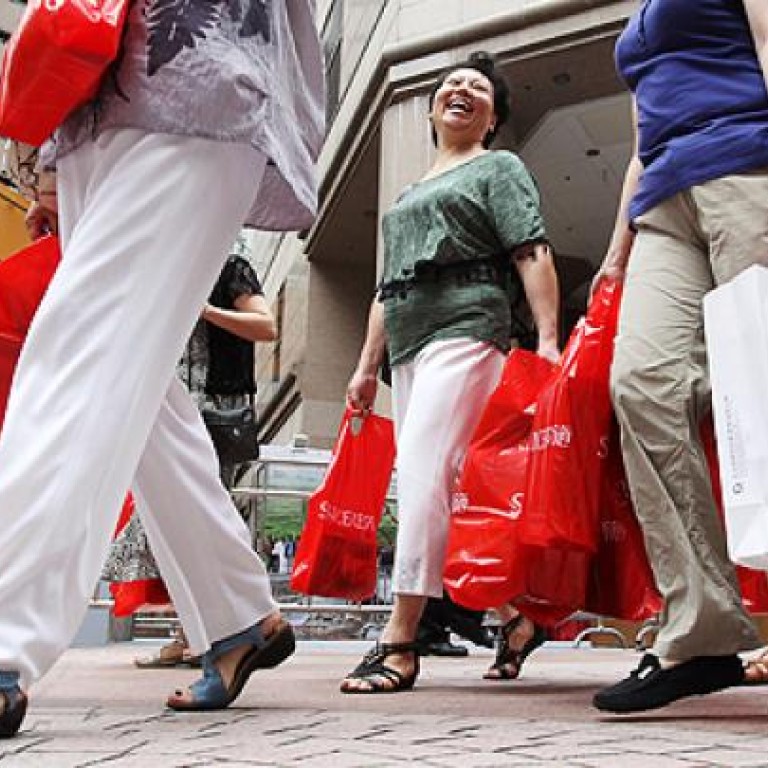
‘Golden week’ shopping arrives amid uncertain times
Judging by sales of certain luxury goods in the shopping heartland of Hong Kong, what gift to give your boss is a conundrum facing more than a few well-heeled mainland visitors during the “golden week” holidays from October 1.
Giving gifts is crucial if you want to get ahead in Chinese politics or business, but what do you do when you don’t know whether your boss is about to be promoted or tossed out of a job?
Judging by sales of certain luxury goods in the shopping heartland of Hong Kong, that’s a conundrum facing more than a few well-heeled mainland visitors during the “golden week” holidays from October 1.
The break is a boom sales period for Hong Kong stores, but this year it’s coinciding with a slowdown in the Chinese economy and the build-up to Beijing’s once-a-decade leadership transition.
The crucial congress that will name the new chiefs of the secretive Communist Party will take place on November 8, state media has announced.
Few analysts expect any surprises at the very top – Vice-President Xi Jinping appears certain to replace President Hu Jintao – but what happens at lower levels of China’s vast machinery of state is anyone’s guess.
Rumours are swirling of deep divisions within the party’s elite, and many analysts say this leadership transition is the most turbulent since Jiang Zemin’s appointment as party leader in 1989.
Evidence of this uncertainty could be on display in the jewellery shops of Hong Kong, where sales of expensive watches, a bellwether of the luxury gift market, have fallen in recent months, analysts and retailers said.
“There’s definitely a decrease in sales this year of about 20 to 30 per cent,” said Wong, a salesman at a fancy watch shop who refused to give his full name.
“It feels like the customers that actually buy things have decreased. There is a big change.”
Analysts put this slump down to China’s slowing economic growth – at 7.6 per cent in the second quarter it’s the slowest since March 2009 – and a drop in overnight stays by mainland tourists.
“If you’re coming for an overnight stay you probably have a bigger budget and you also have more time to spend it,” HSBC Greater China Economist Donna Kwok said.
“Looking at the big picture, the most important thing is that China, for now, is in slowdown mode.”
But there are also signs, largely anecdotal in nature, that at least some of the fall in certain categories of luxury goods could be linked to doubts about who will be in power after the all-important party congress.
Chinese consumers spent an estimated US$49 billion on luxury goods last year, a quarter of a global market worth US$197 billion. They are poised to overtake Americans this year as the biggest buyers of luxury goods in the world.
Analysts say around 20 per cent of the luxury goods Chinese people buy are for gifts, and gifts are often used to grease the wheels of , the Chinese term for relationships that help win jobs and promotions.
Drilling down a bit further, one segment of the gift market that could serve as an informal indicator of is watches, and logically it follows that the more expensive the watch the more powerful the receiver.
“For sure the watch segment has been a bit weaker and the watch category lends itself well to gift giving,” said Aaron Fischer, head of consumer research at Hong Kong-based brokerage CLSA.
“I think with the current political climate, and a bit of a clampdown on corruption, and also a desire to reduce the level of conspicuous consumption, we’re seeing some of those flashier products perform a little bit worse.”
Hong Kong Tourism Board figures show that mainlanders accounted for some 30 per cent of the growth in watches and jewellery sold in Hong Kong in 2010.
In the first half of this year, sales growth in that segment of the luxury market was only 2.2 per cent, compared to 32 per cent in the same time last year.
The boss of a leading luxury goods distributor in Hong Kong said the political uncertainty surrounding Beijing’s power transition was forcing some gift givers to delay their purchases until the dust settled.
He said products that could be affected included expensive French wines, a trendy new addition to the list of acceptable items to give your Chinese boss if you really want to make an impression.
One politician who will not be receiving gifts from ambitious employees is former Chongqing city party boss Bo Xilai, a favourite for one of the top posts in the all-powerful Politburo who was dramatically sacked earlier this year after his wife was accused of murdering a British businessman.
The wife, Gu Kailai, was given a death sentence commuted to life in prison last month, and the police chief who exposed the scandal, Wang Lijun, was sentenced to 15 years in prison on Monday.
China’s state media announced on Friday that Bo will “face justice” for a litany of serious crimes, indicating it will come down hard on the one-time rising star as it prepares to usher in a new generation of leaders.
